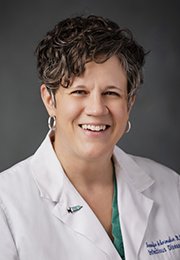A much smaller number of Americans are concerned about the flu epidemic of 2015-2016, even though it is certain to happen, as it does every year. It is known simply as the flu season.
 According to Dr. Jennifer Schrimsher, an infectious disease specialist at The Internal Medicine Group in Lawrence, influenza is not as deadly as Ebola, but it is far more contagious.
According to Dr. Jennifer Schrimsher, an infectious disease specialist at The Internal Medicine Group in Lawrence, influenza is not as deadly as Ebola, but it is far more contagious.
“Ebola is spread only through direct contact with the blood or bodily fluid of a person who is sick with Ebola,” Schrimsher said. “The flu virus is likely to be floating in the air in any public place you visit during flu season.”
From 5 to 20 percent of the population are infected each year with influenza, and 20,000 to 50,000 die.
“The best thing you can do to protect yourself is widely known,” Schrimsher said. “Get a flu shot.”
It’s as simple, easy and important as fastening your seat belt when you get in a car. Yet only about 40 percent of Americans do so in any given year.
As in recent years, vaccination for all Americans age 6 months and over is recommended as the first and most important step in protecting yourself, Schrimsher advised. Other things you should do include washing your hands frequently, steering clear of other sick people, and staying home when you are sick so you don’t infect others.
Those most at risk of getting severe effects of the flu are young children, older adults and people with medical conditions such as cancer or asthma. Last year, about 100 children died and more than 14,000 adults age 65 and over were hospitalized because of the flu. For these high-risk populations and for pregnant women who could pass the virus to their vulnerable infants, vaccination is crucial.
“If you care for or visit high-risk persons, such as an elderly parent or grandparent or a pre-school child, you should get a flu shot, for their sake as well as yours,” Schrimsher said.
She noted that last year’s vaccine was not very effective compared to previous years. “Each year, public health experts decide which viruses are likely to be a threat based on monitoring of flu activity around the world, including recent infections during the southern hemisphere winter,” Schrimsher explained. “A vaccine is then developed to protect against three or four of the most prevalent strains.”
The vaccine last year failed to protect against the predominant Switzerland A strain, which had mutated enough to make it resistant to the vaccine that was developed to combat it. By late summer last year, this H3N2 strain had become the primary illness-causing agent, and it continues to be dominant worldwide.
This year, the trivalent vaccine is made to protect against this strain plus two others: an A strain that was in the previous vaccine and a new B strain. Quadrivalent vaccines (protecting against four rather than three viral strains) include an additional B virus strain.
Schrimsher warns that no one can predict what the flu season will be like this year or how well the vaccine will match up with viral strains that are circulating. But having a flu shot will lower the risk that you will transmit the disease to friends and family. And contrary to what many believe, immunization will not give you the flu.
Flu season generally starts in October. A flu shot takes two weeks to become fully effective.
When the flu strikes hard, it can and does kill. In the influenza pandemics of 1918, 1957 and 1968, millions of deaths worldwide were recorded.
Public health experts acknowledge that flu epidemics every year will always be with us. Schrimsher said, “If two-thirds of the population were as concerned about stopping the flu as they were about protecting themselves from Ebola last year, the toll in terms of serious illness and death would be considerably lower.”
— Janice Early, MBA, is Vice President of Marketing and Communications at Lawrence Memorial Hospital, which is a major sponsor of WellCommons. She can be reached at janice.early@lmh.org.